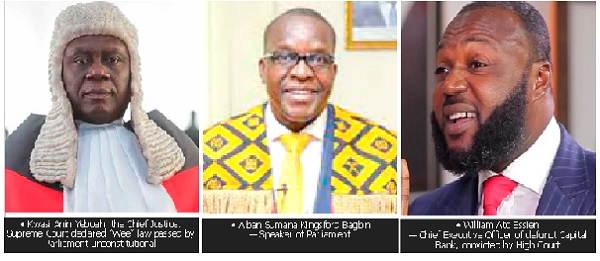
The law courts in 2022: Supreme Court clashes with Parliament, Ato Essien, more
The law courts in the country were very busy in the year 2022 with many prominent civil and criminal cases taking centre stage throughout the year under the review.
While the Supreme Court dealt with some contentious constitutional cases that affected the governance of this country, the High Court was the venue of some high-profile criminal cases that had significant impact on some key sectors of the country.
Advertisement
Deputy Speakers can vote
Perhaps the most contentious law issue last year was whether the Supreme Court had the power to interfere with the work of Parliament.
That played out in two key constitutional cases in which the highest court of the land declared two critical decisions of Parliament as unconstitutional and therefore null and void.
The first case was a decision on March 9, 2022 in which the seven-member panel of the Supreme Court unanimously declared that it was constitutional for a Deputy Speaker presiding over proceedings in Parliament to vote on matters for determination and also be counted as part of the quorum decision –making.
Consequently, the highest court of the land ruled as valid, the passage of the 2022 budget by Parliament on November 30, 2021 during which the First Deputy Speaker, Mr Joseph Osei-Owusu, who was presiding, counted himself as part of the quorum that made that decision.
Also, the Supreme Court declared as unconstitutional, Order 109 (3) of the Standing Orders of Parliament which barred a Deputy Speaker, who is presiding over proceedings, from voting on any issue for determination.
The court gave the judgment after it had dismissed a writ by a lawyer and law lecturer, Justice Abdulai, who challenged the constitutionality of
Mr Osei-Owusu’s decision to be part of the quorum that passed the 2022 budget.
The decision generated heated public discussions about the sovereignty of Parliament vis-à-vis the power of the Supreme Court to strike down certain acts as unconstitutional.
“Wee” law unconstitutional
Four months after that landmark decision, the Supreme Court again touched the nerves of Parliament by declaring as unconstitutional, a section of the Narcotic Control Commission Act, 2020 (Act 1019) which allows licence to be granted to an entity to cultivate a small quantity of cannabis, popularly referred to as "wee" in Ghana for industrial and medicinal purposes.
In a 4-3 majority decision, a seven-member panel of the apex court held that Section 43 of Act 1019 violated Article 106 of the 1992 Constitution, which details the processes a bill must go through before it is passed into law by Parliament, and was therefore null and void.
According to the court, there was no debate on that particular bill in Parliament before its passage into law, as stipulated by Article 106 (5) (6) of the 1992 Constitution.
Again, the apex court was of the considered opinion that the explanatory memorandum attached to the bill placed before Parliament did not set out in details the policy change, the defects in the existing law and the necessity to introduce a law to license the cultivation of cannabis.
Such an omission, it held, was a violation of Article 106 (2) of the 1992 Constitution, and therefore the law was unconstitutional.
The decision by the court was met with criticisms from many sections, especially from Parliament.
First Deputy Speaker of Parliament, Joseph Osei-Owusu, expressed surprise that the Supreme Court had questioned Parliament’s failure to debate Section 43 of the Narcotic Control Commission Bill, 2020 as basis for striking out the law on licence to grow cannabis.
He was emphatic that Parliament indeed debated on the entire bill before passing it into law.
Ato Essien convicted
If there is an individual who symbolises the criminal justice system of the country in 2022, that person should be William Ato Essien, the Founder of the defunct Capital Bank, who was convicted by the Accra High Court for stealing GH¢192.5 million of funds from the bank.
After almost three years of trial, Essien faced the judgment where he was found guilty on his own plea.
The former local entrepreneur in the financial sector however avoided custodial sentence after he reached an agreement with the state to pay GH¢90 million to the state.
The agreement was pursuant to Section 35 of the Courts Act, 1993 (Act 459), which allows accused persons standing trial for causing financial loss to the state to pay the money and possibly avoid a custodial sentence.
By virtue of pleading guilty, the court also barred Essien from being appointed as a director or holding any key management position in any bank or financial institution in line with the Banks and Specialised Deposit-Taking Institutions Act, 2016 (Act 930).



